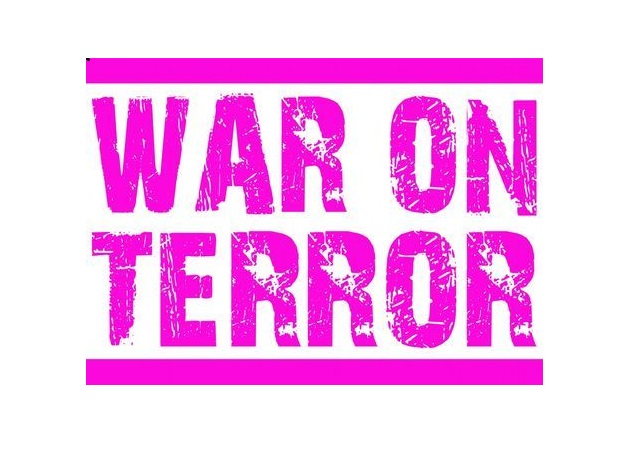Let me begin this post by doing what I specifically instruct my students not to do at the beginning of a paper: give a dictionary definition of a word. Usually just filler in collegiate papers, it might actually serve some purpose in this case because the primary way in which the word “terror” is being used in public discourse today does not in fact correspond to its primary definition. The first entry for the word “terror” in the Oxford English Dictionary is:
“the state of being terrified or extremely frightened; intense fear or dread”
It is not until the third entry that we come to the sense in which the term is most commonly used in public discourse today, and even then the first definition given (3.a.) remains specific to past historical events:
The period of the French Revolution from about March 1793 to July 1794, marked by extreme repression and bloodshed; a similar period of violent repression occurring in other countries, esp. the former Soviet Union during the first half of the 20th cent.
Under the heading of these historical designations (“the Terror”, “the Red Terror”) is the meaning to which we are now most accustomed:
The use of organized repression or extreme intimidation; terrorism.
The selected instances of usage are fascinating enough in themselves, the last of which comes from a 2004 issue of The New York Times Magazine (51/1, 2 May): “All the major countries on the front line of the war on terror are currently detaining such suspects, often for indefinite periods of time.”
It is this definition with which my own children associate the word first and foremost. For them, “terrorism” is the primary meaning of the word “terror.” So it bears asking: if the most common usage of the word today corresponds to a tertiary derivative of its primary definition, what work is it actually doing? To what concept, what reality is this omnipresent term “terror” actually pointing?
The word still bears the distinctive marks of its primordial ancestor: fear. “Terror” today is about fear just as much as “the Terror” or “the Red Terror” were.
But it is also now, even perhaps more than in the past, a word of war. It names an enemy in which we are engaged in relentlessly armed struggle. People die at the hands of “terror,” and we kill in the cause of its opposition.
What is more, and perhaps even more urgent, is that it names a discrete legal category, which carries very real and very sweeping social and political implications. Once we name an act an “act of terror,” as the authorities recently did in the course of the Eric Frein manhunt in Pennsylvania or as President Obama (apparently) did in the wake of the Benghazi embassy attack, the whole game changes. Laws change, or at least our obligation to observe certain laws changes. If it is a matter of “terrorism,” we are now justified to take drastic measures, implement drastic policies.
So how do we identify terror in the world around us? What are the primary characteristics of “organized repression” or “extreme intimidation”? Is the use of non-state-sanctioned bombs against state actors by definition “extreme intimidation”? Could non-state actors, such as the Palestinians, meaningfully accuse nation-states of “terror”? They certainly have, of course. Do we “count” that use of the word as truly expressive of definition 3.b., or should we assume that it is an analogical use of that particular sense of the term? (It is interesting to note that definition 3.b. is a sub-heading of a term explicitly associated with the nation-states of France and the Soviet Union.)
If the use of that particular sense of the term is contested, is there perhaps another term that could more precisely identify what we mean by “terror” and “terrorism,” at least for concrete political purposes (such as drone attacks and the suspension of civil liberties)? Could we, for instance, substitute for “terror” the terms “indiscriminate aggression”, “disproportionate belligerence,” or even just “unjust armed attack”?
We all know the answer is no, but why? It is not simply because “terror” is more economical and so “catchier”; it is more concretely because “terror” has to encompass acts of “repression” or “intimidation” that may not themselves be physically violent or destructive. Terror must encompass threats as well as overt acts of violence. Here’s a question, though: why isn’t bullying terrorism?
And here’s an alternative definition that a student once proposed to me in the course of a class on War (as we were reading through Daniel Bell’s terrific book Just War as Christian Discipleship): “terrorism refers to the ideology of and/or engagement in armed conflict that eschews any or all of the constrictions of just war doctrine.”
Many eminent thinkers, such as Jean Bethke Elshtain and Michael Ignatieff, have engaged and wrestled with this admittedly simplistic characterization of terrorism in relation to just war theory, but all too often the final outcome of such analyses is some variant of “the matter is very complex and there are no simple answers.”
But I ask you: from the perspective of the Christian just war tradition, is there any better universal definition of terrorism than the egregious and systematic violation of certain just war tenets (jus in bello principles in particular)? It not only has the advantage of greater conceptual specificity, but it can also be correlated with actual acts deemed to be the sorts of moral violations of which we regularly accuse “terrorists.” Yet, most importantly of all, it can refer not merely to non-state actors and our enemies, but to our own government and our own community as well.
But is such a definition of terrorism any less absurd and dangerous than the one we have in place now? How does one meaningfully wage a war on “unjust war”? How could we ever determine a stable object of armed engagement if our criteria for identifying one is conformity to the criteria of just war? If we cannot realistically define or use the term “terror” in relation to just war theory, then once again: what does that say about how we use the word today?
So here’s my verdict, as underdeveloped and impetuous as it may seem (what are blog posts for, anyway?): the way we use the term “terror” in our (North Atlantic) society today reflects not so much a righteous anger at the violation of just war as it does an unwillingness to die in order to preserve its conditions and requirements.
If “terror” constitutes a just cause for armed conflict (which, according to my alternative definition, I believe it may), are we as a community willing to die rather than to violate justice in the pursuit of confronting that injustice? Let me make a blanket statement and say that for the most part, that willingness to sacrifice for the sake of justice is very much alive among the members of the armed forces of our country. Go and read the stories of those who have been posthumously awarded the Congressional Medal of Honor sometime: here (if anywhere) is where you will find the realization of just war in our world today. But is this same willingness to sacrifice anywhere present at the level of policy?
Are those who made, and who now monitor and update, the “national terrorism advisory system” willing to give their lives rather than violate the very injustice which they believe still threatens our community and “way of life”?
What sort of answer to that question does the recent Senate report on torture suggest, if it bears even a scintilla of truth? What sort of answer to that question is suggested by the alarming increase in instances in which police use astoundingly disproportionate violence to oppose the (apparent) injustices they encounter each day on the streets?
Let’s be honest: what we fight when we fight terrorism is not, at root, “organized repression” or extreme intimidation;” what we rage against is really our own vulnerability.
What the word “terror” names is not merely our own fear in the face of indiscriminate and unjust violence, but also our own fear that our commitment to the demands of justice just might cost us our lives. And as Christians, we must be courageous enough to say: it very well may.




